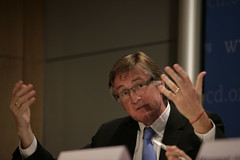ASIA
04 May 2014
Quality Jobs & Inequality
We had the opportunity to meet with UNI Global Union’s General Secretary Philip Jennings, just ahead of OECD Forum 2014, to hear his views on the issue of “Quality Jobs & Inequality”.
We had the opportunity to meet with UNI Global Union’s General Secretary Philip Jennings, just ahead of OECD Forum 2014, to hear his views on the issue of “Quality Jobs & Inequality”.
Here is what Jennings had to say:
Jennings said, “Quality jobs and an end to widening global inequality are the North Star of a sustainable recovery. The 1% have got richer and richer in the last 30 years at the expense of the 99%: in the United States alone the 1% have almost 50% of overall income growth. This is bad for democracy, economic growth but above all it is bad for the people.
There is now a compelling shift in evidence that not only is this neo-liberal model unfair, designed by and for the 1%; it is also bleeding the economy of vitality and purchasing power.
The OECD is on the right track to finding new economic thinking to shatter the neo-liberal Washington consensus. It’s time to put people back into the equation. The most vulnerable groups including youth are feeling the brunt of skewed policies designed to protect the rich in name of economic growth. Last week I was in Korea where inequality is rife. A warning on how fractured a society can become.
The solution is to include everyone in the recovery, decent jobs, healthcare and education. An evener spread of the world’s wealth would make this an achievable goal. UNI chose the theme Including You for its upcoming 4th World Congress in Cape Town, in December. Inclusion is the key to recovery. We need sustainable jobs. Workers deserve a living wage: that is the message I will take to the OECD in Paris next week and on to Cape Town.”
Jennings is proud of the role UNI played in working with its sister global union IndustriALL in creating the Bangladesh Safety Accord in response to the Rana Plaza factory collapse 24 April 2013 which claimed the lives of more than 1,100 garment workers in Bangladesh. The Accord is a legally binding agreement and has been signed by over 160 global brands from 20 countries in Europe, North America, Asia and Australia.
Jennings has called the Bangladesh Accord a game-changer not just in Bangladesh, but all along the global supply chains of the big multinationals.
“The Bangladesh Accord is about quality jobs and creating a safe working environment. We will only make progress if workers have a voice on the job.” Jennings added.
Philip Jennings will participate in the “Inclusive Societies” session of OECD Forum 2014 on Monday 5 May 2014.
Here is what Jennings had to say:
Jennings said, “Quality jobs and an end to widening global inequality are the North Star of a sustainable recovery. The 1% have got richer and richer in the last 30 years at the expense of the 99%: in the United States alone the 1% have almost 50% of overall income growth. This is bad for democracy, economic growth but above all it is bad for the people.
There is now a compelling shift in evidence that not only is this neo-liberal model unfair, designed by and for the 1%; it is also bleeding the economy of vitality and purchasing power.
The OECD is on the right track to finding new economic thinking to shatter the neo-liberal Washington consensus. It’s time to put people back into the equation. The most vulnerable groups including youth are feeling the brunt of skewed policies designed to protect the rich in name of economic growth. Last week I was in Korea where inequality is rife. A warning on how fractured a society can become.
The solution is to include everyone in the recovery, decent jobs, healthcare and education. An evener spread of the world’s wealth would make this an achievable goal. UNI chose the theme Including You for its upcoming 4th World Congress in Cape Town, in December. Inclusion is the key to recovery. We need sustainable jobs. Workers deserve a living wage: that is the message I will take to the OECD in Paris next week and on to Cape Town.”
Jennings is proud of the role UNI played in working with its sister global union IndustriALL in creating the Bangladesh Safety Accord in response to the Rana Plaza factory collapse 24 April 2013 which claimed the lives of more than 1,100 garment workers in Bangladesh. The Accord is a legally binding agreement and has been signed by over 160 global brands from 20 countries in Europe, North America, Asia and Australia.
Jennings has called the Bangladesh Accord a game-changer not just in Bangladesh, but all along the global supply chains of the big multinationals.
“The Bangladesh Accord is about quality jobs and creating a safe working environment. We will only make progress if workers have a voice on the job.” Jennings added.
Philip Jennings will participate in the “Inclusive Societies” session of OECD Forum 2014 on Monday 5 May 2014.




